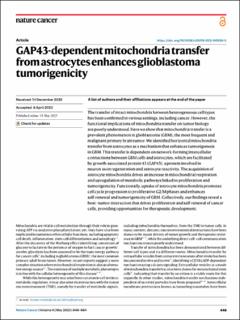GAP43-dependent mitochondria transfer from astrocytes enhances glioblastoma tumorigenicity
Watson, Dionysios C.; Bayik, Defne; Storevik, Simon Humberto; Moreino, Shannon Sherwin; Sprowls, Samuel A.; Han, Jianhua; Augustsson, Mina Thue; Lauko, Adam; Sravya, Palavalasa; Røsland, Gro Vatne; Troike, Katie; Tronstad, Karl Johan; Wang, Sabrina; Sarnow, Katharina; Kay, Kristen; Lunavat, Taral; Silver, Daniel J.; Dayal, Sahil; Vareecal Joseph, Justin; Mulkearns-Hubert, Erin; Ystaas, Lars Andreas Rømo; Deshpande, Gauravi; Guyon, Joris; Zhou, Yadi; Magaut, Capucine R.; Seder, Juliana; Neises, Laura; Williford, Sarah E.; Meiser, Johannes; Scott, Andrew J.; Sajjakulnukit, Peter; Mears, Jason A.; Bjerkvig, Rolf; Chakraborty, Abhishek; Daubon, Thomas; Cheng, Feixiong; Lyssiotis, Costas A.; Wahl, Daniel R.; Hjelmeland, Anita B.; Hossain, Md Jubayer al; Miletic, Hrvoje; Lathia, Justin D.
Journal article, Peer reviewed
Published version

Åpne
Permanent lenke
https://hdl.handle.net/11250/3111843Utgivelsesdato
2023Metadata
Vis full innførselSamlinger
- Department of Biomedicine [708]
- Registrations from Cristin [9489]
Sammendrag
The transfer of intact mitochondria between heterogeneous cell types has been confirmed in various settings, including cancer. However, the functional implications of mitochondria transfer on tumor biology are poorly understood. Here we show that mitochondria transfer is a prevalent phenomenon in glioblastoma (GBM), the most frequent and malignant primary brain tumor. We identified horizontal mitochondria transfer from astrocytes as a mechanism that enhances tumorigenesis in GBM. This transfer is dependent on network-forming intercellular connections between GBM cells and astrocytes, which are facilitated by growth-associated protein 43 (GAP43), a protein involved in neuron axon regeneration and astrocyte reactivity. The acquisition of astrocyte mitochondria drives an increase in mitochondrial respiration and upregulation of metabolic pathways linked to proliferation and tumorigenicity. Functionally, uptake of astrocyte mitochondria promotes cell cycle progression to proliferative G2/M phases and enhances self-renewal and tumorigenicity of GBM. Collectively, our findings reveal a host–tumor interaction that drives proliferation and self-renewal of cancer cells, providing opportunities for therapeutic development.
